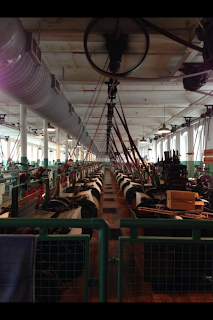On Wednesday
September 25th we were given a tour of the Boott Cotton Museum. The museum was able to open my eyes to what
life was like for girls in the 1830s in a way that nothing else could. The building looks just like any other run
down mill in Lowell, except the inside has been preserved to look just like it did in the 19th century. We walked into the first floor where there
was a room full of looms. This is shown
in the picture below. The first thing
that struck me was the terribly loud noise, and that was only with the back row
of machines running. I cannot even
imagine the painful noises created when all of the machines were running in a terrible sort of harmony.
We then learned
about the history of the mills. I found
it difficult to believe that the floors I was walking across were the same
floors that the mill girls once worked their lives away on. Our tour guide then had us students
participate in an assembly line where we produced cotton towels under similar
conditions that the factory workers were under.
Although this was a fun exercise filled with laughter and silliness, I
couldn’t help but think that this game we were all playing was once a young girl’s
life. It was not a joke to these girls. In fact, they had to live in constant fear of getting fired, or even worse, getting killed by the deadly machines.
The tour guide
acted as the factory supervisor in the assembly line, who would be in charge of the work when the
factory owner was not present. She barked
orders at us workers in such a ruthless manner.
She would increase the amount of work, decrease wages, layoff workers
and play favorites. There was no sense
of sympathy in her voice; she completely dehumanized her workers. It sickens me to think that these situations were actually a reality many years ago, for girls just like me. This activity showed us a
glimpse of the daily struggles that these factory workers faced. The working conditions were ridiculously
unfair in every aspect. It also showed us how different the lifestyles of the factory worker and the factory owner were. The girls slaved over their machines for their measly salary while the factory owner lived a wonderful, carefree life with more money than he can imagine.
Eddie Vedder’s cover of “Millwork” does a great job
explaining the many hardships of being a factory worker. One of the lines states, “Then it’s me and my
machine, for the rest of the morning, for the rest of the afternoon, and the
rest of my life.” This is an extremely
depressing line, but it unfortunately holds much truth. This is all that life had to offer for these
young factory girls of Lowell. They
could not strive for upward mobility, they just continued with their painfully
boring lives. Another powerful line
says, “And I have been the fool, to let this manufacturer use my body for a
tool”. This is exactly how the assembly
line made me feel. In the factory, these
girls did not have a name, they were just tools. What is even sadder is that these girls
acknowledged how poorly they were treated, but they could not do a thing to
help themselves in this terrible situation.
This is because millwork was not considered a terrible situation. These girls were supposed to feel lucky for
the wonderful opportunity they were given.
It’s incredibly sad to think that young girls felt grateful for their
work in Lowell and the dangerous conditions they endured.
I always thought that conditions such as those in the Lowell mills were nonexistent in today’s
world, but I certainly was wrong. The
Nightline documentary on Foxconn revealed that those brutal working conditions
are still very present today. Foxconn is
a manufacturer in China for Apple products such as the iTouch.
The working and living conditions in the Chinese factory are almost
identical to the conditions that the girls working in Lowell once faced. Most of the workers in China are teenagers
coming from small villages outside of the city.
They all hope to start a better life for themselves and earn money for
their families. They are put in very
dangerous situations with potential explosions everywhere. The workers in China pay for housing in dorms
with seven others along with overpriced cafeteria food. They work all day long with only two
breaks.
What interested me was
that these workers listened to computerized voiced that ordered them what to
do. In the assembly line, each worker
had a specific job to do within a certain amount of seconds. Not only are these workers completely bored,
but they are also put under a great deal of pressure to keep up with the rapid pace
of work. This reminded me exactly of the
assembly line I participated in at the Boott Cotton Museum.
Unfortunately for the
workers of China, they are not allowed to form labor unions to protect their right
and improve their conditions. I think
that this will change in the near future.
People must take action before the factory work worsens. I think steps similar to those taken with the
Lowell factories need be taken in China.










Brittany, great write-up. I'm glad you were able to get so much out of the experience and be able to write about it so well. This was a terrific response. 10/10
ReplyDelete